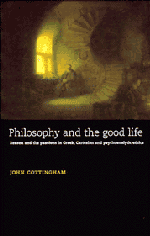3 - The ethics of science and power
Published online by Cambridge University Press: 04 May 2010
Summary
Meta autem scientiarum vera et legitima non alia est quam ut dotetur vita humana novis inventis et copiis.
(‘The true and lawful goal of the sciences is none other than this: that human life should be endowed with new discoveries and powers.’)
Francis BaconTHE CARTESIAN REVOLUTION: MATHEMATICAL TRANSPARENCY AND ARBITRARY LAW
Le silence éternel de ces espaces infinis m'effraie.
(‘The eternal silence of these infinite spaces terrifies me.’) Blaise Pascal
It is a familiar fact that the seventeenth-century revolution in philosophy profoundly altered our conception not just of the physical universe but of the very nature of scientific understanding. But although that revolution is often presented by historiographers as a purely epistemological and scientific affair, it also subtly and irreversibly altered philosophy's relationship to its age-old task of providing an account of how humans can live fulfilled lives. In order to understand how that shift came about, it will be necessary first to lay out the principal respects in which the new seventeenth-century world-view differed from what had gone before.
The old picture, dominant in the Middle Ages, and broadly based on Platonic and Aristotelian elements incorporated within a Judaeo-Christian metaphysic, was of a benign and intelligible cosmos, with the earth at its centre – a universe made up of substances whose nature could be understood in terms of readily graspable forms and essences (what Aristotle had called ‘formal causes’), and whose behaviour could be understood teleologically, in terms of a progression towards a series of specifically ordered goals or end-states.
- Type
- Chapter
- Information
- Philosophy and the Good LifeReason and the Passions in Greek, Cartesian and Psychoanalytic Ethics, pp. 61 - 103Publisher: Cambridge University PressPrint publication year: 1998



